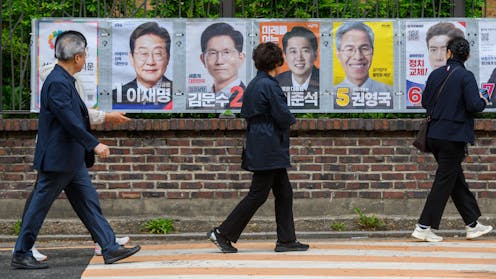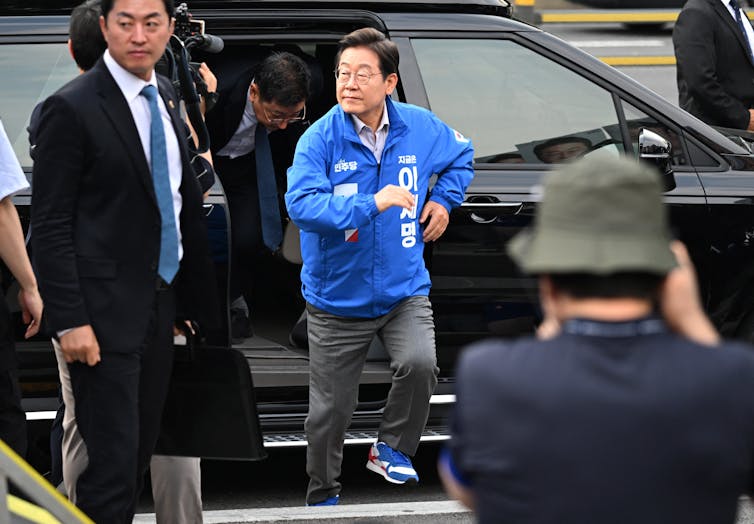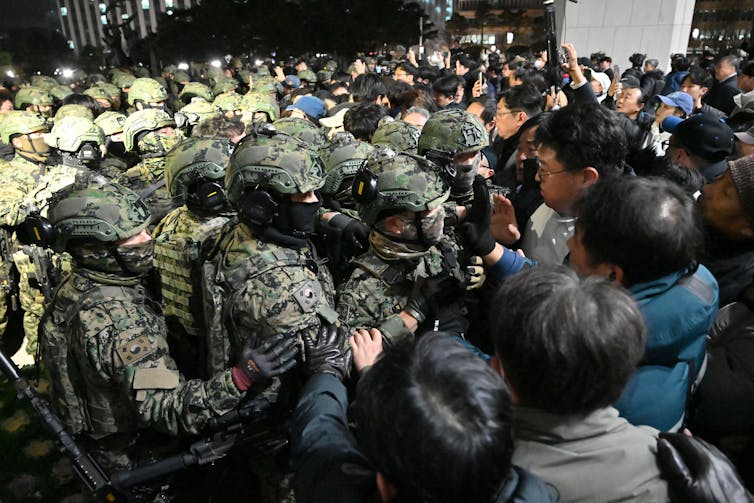3 things to watch as South Koreans head toward the polls following turbulent political period
- South Koreans will head to the polls on June 3, 2025, to vote for a new president after a tumultuous election season marked by impeachment and martial law.
- The opposition Democratic Party, led by Lee Jae-myung, is expected to win the presidency, but his campaign has faced challenges due to ongoing legal trials and skepticism about his political moderation.
- The ruling People’s Power Party, led by Kim Moon-soo, is trying to move past its disgraced leader Yoon Suk Yeol, who was impeached last December, while reconciling with voters who supported his impeachment.
- A center-right third-party candidate, Lee Jun-seok, has emerged as a potential dark horse in the election, presenting himself as a reformer who can bridge the gap between conservatives and progressives.
- The final outcome of the election will depend on various factors, including whether swing voters prioritize retrospective judgments about Yoon’s presidency or prospective concerns about Lee Jae-myung’s policies, and how Lee Jun-seok’s campaign performs in the final days leading up to the election.

On June 3, 2025, South Koreans will head to the polls to vote for a new president.
The election caps a particularly turbulent several months in the country’s politics that began with right-wing President Yoon Suk Yeol declaration of martial law last December. The opposition-controlled National Assembly swiftly moved to rescind Yoon’s order and then impeached him just a week later.
After months of subsequent trial, during which South Korean society was polarized by public rallies supporting and opposing impeachment, the South Korean Constitutional Court unanimously upheld the impeachment in April.
As momentous as the period has been for South Korean politics, it feels like déjà vu from 2017, when a snap presidential election was held following the impeachment of then-President Park Geun-hye. As with that election, there is widespread anticipation that the opposition Democratic Party will win the presidency this time. However, during the two-month-long campaign season, the race has narrowed to a tighter-than-expected contest among the three leading presidential candidates.
Here are three key things to look out for as South Koreans head to the polls:
1. The opposition’s challenge to the status quo
As the main opposition party that successfully impeached Yoon, the center-left Democratic Party has been the favorite to come ahead in the election. The party — together with a small grouping of other progressive-leaning parties — quickly unified around Democratic Party leader Lee Jae-myung. Polls have consistently shown Lee in the lead, though his support has lagged behind public support for Yoon’s impeachment. This suggests that even among voters who favor political change, some remain ambivalent about the prospect of a Lee’s presidency.
In response, Lee’s campaign has sought to rebrand his political image.
Generally regarded as a progressive political figure in favor of policies including a universal basic income and a pro-engagement foreign policy toward North Korea and China, Lee has shifted rightward, recruiting conservative political figures into his campaign and promising pragmatic, business-friendly economic policies.

Jung Yeon-je/AFP via Getty Images)
Though, in the past, Lee has made comments critical of past U.S. foreign policy and appeared to suggest South Korea’s strategic neutrality in the great power rivalry between Washington and Beijing, in this campaign Lee has reaffirmed his support behind the U.S.-South Korea alliance.
However, he has continued to encounter skepticism about the authenticity of his political moderation.
Lee also faces vulnerabilities due to his ongoing legal trials. In October 2024, a district court convicted him of violating election law by knowingly giving a false statement during a debate and suspended his eligibility for presidential candidacy for five years. Then, in March, an appeals court acquitted Lee, freeing him to campaign in the snap election. However, at the beginning of May, South Korea’s Supreme Court overturned the ruling, remanding the case back to the appeals court.
With the appeals court postponing the retrial until after the presidential election, Lee’s campaign has avoided the risk of being barred from the race. However, controversy continues over whether Lee’s trials would be suspended if he wins the presidency.
Lee’s campaign has asserted that a sitting president cannot be criminally prosecuted, except in cases of treason. But the South Korean Constitution’s ambiguity about whether such immunity applies to ongoing trials involving presidential candidates creates political uncertainty for the Democratic Party leader.
2. Ruling party tries to move past disgraced leader
The party of the now-impeached Yoon, the right-wing People’s Power Party, has struggled to thread the needle of keeping Yoon’s supporters on board, while reconciling with the majority of South Korean voters who supported his impeachment.
This attempt to move on from Yoon’s contested legacy was reflected in a bitterly contested party primary to pick his successor. Kim Moon-soo, the former labor minister in Yoon’s government who opposed impeachment, was nominated and eventually secured the spot, but not before overcoming an internal upheaval by party leaders who were skeptical of Kim’s competitiveness in the general election.
Facing an uphill battle, Kim has sought to reframe the election narrative by capitalizing on voters’ reservations about Lee. Contrasting himself with Lee’s legal allegations, Kim portrayed himself as an uncorrupt, principled candidate with a record as a labor activist during South Korea’s military rule in the 1970s and 1980s.
However, Kim has continued to struggle to expand support among moderate voters who have criticized his political evolution from a renowned progressive activist to a hard-right political figure with close political ties to the disgraced Yoon.
Though Yoon eventually left the PPP voluntarily, Kim’s campaign has continued to walk a tightrope in distancing itself from the impeached former president without alienating Yoon’s supporters.

Jung Yeon-je/AFP via Getty Images
Kim’s campaign strategy also reflects this tension. In an appeal to swing voters, Kim has pledged the development of regional provinces, increased child care and housing support for young families, and a constitutional amendment to limit presidential powers.
But he has continued to keep pro-Yoon figures in his campaign team and has courted support from another impeached president, Park Geun-hye, who retains some support among core conservative voters.
Kim’s strategy appears to have partially been successful in closing the gap with Lee, though polls show Kim continues to lag by 5 to 10 percentage points.
3. Potential opening for a center-right third way?
The public dissatisfaction with both major-party candidates has left an opening for the center-right New Reform Party’s presidential candidate, Lee Jun-seok. Lee, a 40-year-old legislator, previously served as the PPP’s youngest party leader before being ousted by Yoon’s faction and subsequently founding his own splinter party. In the presidential race, he has presented himself as the only candidate not tainted by legal liabilities or ties to the impeached president.
Lee Jun-seok has sought to burnish his image as a center-right reformer who is committed to conservative policies but rejects the insulated, outdated political culture of the conservative political establishment. Supporting Yoon’s impeachment, Lee has also condemned Yoon’s unconstitutional abuse of martial law and espousal of election fraud conspiracy theory.
During the presidential TV debates, Lee Jun-seok has persistently criticized the two establishment party candidates as unqualified to lead the country. That, and policies intended to address the concerns of the younger generation, has helped increase his support to around 10% – a meaningful achievement for a third-party candidate, as South Korean law guarantees a campaign reimbursement for candidates who receive over 10% of votes.
Looking ahead in the final days
South Korea’s election law bans the release of public poll results during the six days leading up to an election. The final batch released before the ban period indicates that though Lee Jae-myung maintains a lead, his support has stagnated in the high 40s.
Two factors may impact the final election outcome:
First, Kim’s campaign has urged Lee Jun-seok to form a unity ticket, citing polls that show the combination of their support equals or even surpasses Lee Jae-myung’s. However, Lee Jun-seok has rejected such overtures. Even if he suspends his campaign to endorse Kim, it is unclear whether his supporters would switch their support. Should Lee Jun-seok stay in the race, whether his campaign draws more votes from Lee Jae-myung or Kim could affect the election outcome.
The second factor is whether voters are ultimately more motivated by retrospective or prospective judgments. Many South Koreans are receptive to Lee Jae-myung’s view that the political party responsible for what many see as Yoon’s attempted self-coup should face electoral judgment.
However, many also resonate with Kim and Lee Jun-seok’s warning that Lee Jae-myung’s presidency, despite the latter’s reassurances, could result in radical economic and political changes, empowered by the Democratic Party’s unchecked control of the executive and legislative branches.
For many of the remaining swing voters, it represents a dilemma of choosing the “lesser of two evils.” Whether they prioritize anger over the past presidency or apprehension of the prospective future president may decide the election.
![]()
Jong Eun Lee does not work for, consult, own shares in or receive funding from any company or organization that would benefit from this article, and has disclosed no relevant affiliations beyond their academic appointment.
